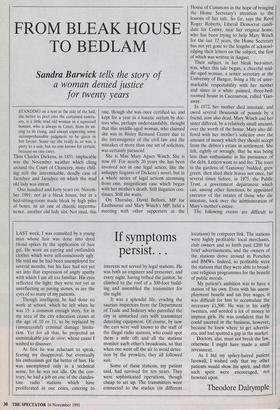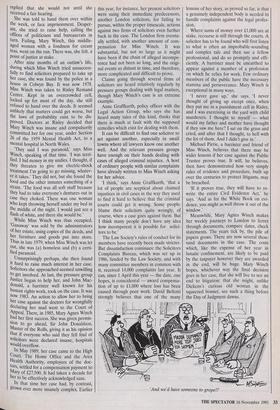FROM BLEAK HOUSE TO BEDLAM
a woman denied justice for twenty years
STANDING on a seat at the side of the hall, the better to peer into the curtained sanctu- ary, is a little mad old woman in a squeezed bonnet, who is always in Court, from its sit- ting to its rising, and always expecting some incomprehensible judgment to be given in her favour. Some say she really is, or was, a party to a suit; but no one knows for certain, because no one cares.
Thus Charles Dickens, in 1851: implacable was the November weather which clung around the Court of Chancery, more chill- ing still the interminable, deadly case of Jarndyce and Jarndyce on which the mad old lady was intent.
One hundred and forty years on. Novem- ber 1991: not in a bleak house, but in a bed-sitting-room made bleak by high piles of boxes, its air one of chaotic imperma- nence, another old lady sits. Not mad, this one, though she was once certified so, and kept for a year in a lunatic asylum by doc- tors who, perhaps understandably, thought that this middle-aged woman, who claimed she was in Risley Remand Centre due to the intransigence of the civil law and the mistakes of more than one set of solicitors, was certainly paranoid.
She is Miss Mary Agnes Winch. She is now 69. For nearly 20 years she has been involved not in one legal action, like the unhappy litigants of Dickens's novel, but in a whole series of legal actions stemming from one, insignificant case which began with her mother's death. Still litigation con- tinues. Still she waits.
On Thursday, David Bellotti, MP for Eastbourne and Mary Winch's MP, held a meeting with other supporters at the House of Commons in the hope of bringing the Home Secretary's attention to the lessons of her tale. So far, says the Revd Roger Roberts, Liberal Democrat candi- date for Conwy, near her original home, who has been trying to help Mary Winch for the last 12 years, the Home Secretary has not yet gone to the lengths of acknowl- edging their letters on the subject, the first of which was written in August.
Their subject, in her bleak bed-sitter, was, when this tale began, a cheerful mid- dle-aged woman, a senior secretary at the University of Bangor, living a life of unre- markable respectability with her mother and sister in a white painted, three-bed- roomed house in Caernarvon, called 'Gan- away.'
In 1972, her mother died intestate, and owed several thousands of pounds by a friend, now also dead. Mary Winch and her sister differed, by a relatively small amount, over the worth of the house. Mary also dif- fered with her mother's solicitor over the amount of money which they should accept from the debtor's estate in settlement. She felt, rightly or wrongly, that he was being less than enthusiastic in his pursuance of the debt. Letters went to and fro. The trees in the gardens of `Ganaway' budded, grew green, then shed their leaves not once, but several times before, in 1975, the Public Trust, a government department which can, among other functions, be appointed executor of the estates of those who die intestate, took over the administration of Mary's mother's estate.
The following events are difficult to describe. Mary Winch is now, and has been for the last four years, suing the Public Trustee's office for its alleged lack of prop- er care in the matter. In summary, she Claims that, through a whole series of events which were not her fault, she was never able to attend the court's hearings, and never saw crucial affidavits. During this period, and later, she claims, rightly or wrongly, that errors were made to her dis- advantage by not one, but around half a dozen firms of solicitors acting for her. At one hearing, which she was too physically unwell to attend, she was not represented by her own lawyers. In her absence a court order was made that Mary should hand over the title deeds of her mother's house. Miss Winch requested her lawyers to appeal. She says they advised against it, despite the fact that she had not been represented in court.
By 1977, the white-painted front door of the three-bedroomed house in Caernarvon had been padlocked against her. It was, in its way, a metaphor. Mary Winch was, from now on, barred from suburban respectabili- ty. She was summoned to court for con- tempt. The judge, Vice-Chancellor Blackett-Ord, asked her if she would now give up the title deeds of her home; she replied that she would not until she received a fair hearing. She was told to hand them over within the week, or face imprisonment. Desper- ate, she tried to raise help, calling the Offices of politicians and bureaucrats in turn. Failing, Mary Winch, this middle- aged woman with a fondness for cream teas, went on the run. There was, she felt, a Point of justice at stake.
After nine months of an outlaw's life, during which Miss Winch tried unsuccess- fully to find solicitors prepared to take up her case, she was found by the police in a house in Colwyn Bay. It was now 1978. Miss Winch was taken to Risley Remand Centre. Kept in an overcrowded cell, locked up for most of the day, she still refused to hand over the deeds. It seemed unlikely that matters could get worse, but the laws of probability exist to be dis- proved. Doctors at Risley decided that Mary Winch was insane and compulsorily committed her for one year, under Section 26 of the 1959 Mental Health Act, to a mental hospital in North Wales. 'They said I was paranoid,' says Miss Winch, speaking of that time. 'I was terri- fied. I hid money in my undies. I thought, if they threaten to give me electric-shock treatment I'm going to go missing, whatev- er it takes.' They did not, but she found the food and the other inmates something of a strain. 'The food was all soft stuff because they had to take everyone's dentures out in case they choked. There was one woman Who kept throwing herself under my bed in the middle of the night. I would just see a flash of white, and there she would be.'
While Miss Winch was thus occupied, `Ganaway' was sold by the administrators of her estate, using copies of the deeds, and her furniture and goods put into store. Thus in late 1979, when Miss Winch was let out, she was (a) homeless and (b) a certi- fied paranoid.
Unsurprisingly perhaps, she then found It hard to raise much interest in her case. Solicitors she approached seemed unwilling to get involved. At last, the pressure group Justice began to help her, and John Mac- donald, a barrister well known for his human rights work, took on the case. It was now 1983. An action to allow her to bring her case against the doctors for wrongfully declaring her mad went to the Court of Appeal. There, in 1985, Mary Agnes Winch had her first success. She was given permis- sion to go ahead, Sir John Donaldson, Master of the Rolls, giving it as his opinion that if everyone who said they fell foul of solicitors were declared insane, hospitals would overflow.
In May 1989, her case came to the High Court. The Home Office and the Area Health Authority, employers of the doc- tors, settled for a compensation payment to Mary of £27,500. It had taken a decade for her to be effectively acknowledged sane. In that time her case had, by contrast, grown ever more insanely complex. Earlier this year, for instance, her present solicitors were suing their immediate predecessors, another London solicitors, for failing to pursue, within the proper timescale, actions against two firms of solicitors even further back in the case. The London firm eventu- ally settled, with another amount of com- pensation for Miss Winch. It was substantial, but not so large as it might have been if the chain of alleged incompe- tence had not been so long, and the origi- nal events so distant in time, and therefore, more complicated and difficult to prove.
Claims going through several firms of solicitors are heard relatively regularly by pressure groups dealing with legal matters, though Mary Winch's case is an extreme example.
Anne Graffkurth, policy officer with the Legal Action Group, who says she has heard many tales of this kind, thinks that there is much at fault with the supposed remedies which exist for dealing with them.
It can be difficult to find one solicitor to act against another, especially in small towns where all lawyers know one another well. And the relevant pressure groups have enough on their hands dealing with cases of alleged criminal injustice. A host of ordinary people with similar complaints have already written to Miss Winch asking for her advice.
'I think,' says Anne Graffkurth, 'that a lot of people are sceptical about claimed injustices in civil cases in the way they used to find it hard to believe that the criminal courts could get it wrong. Some people blame their solicitors quite wrongly, of course, when a case goes against them. But I think many people don't have any idea how incompetent it is possible for solici- tors to be.'
The Law Society's rules of conduct for its members have recently been made stricter.
But dissatisfaction continues: the Solicitors Complaints Bureau, which was set up in 1986, funded by the Law Society, and with many committee members in common with it, received 14,000 complaints last year. It can, since 1 April this year — the date, one hopes, is coincidental — award compensa- tion of up to £1,000 where loss has been caused through poor work. David Bellotti strongly beeves that one of the many lessons of her story, as proved so far, is that a genuinely independent body is needed to handle complaints against the legal profes- sion.
Where sums of money over £1,000 are at stake, recourse is still through the courts. A solicitor has to be found who will first listen to what is often an improbable-sounding and complex tale and then sue a fellow professional, and do so promptly and effi- ciently. A barrister must be unearthed to appear against a member of a profession on which he relies for work. Few ordinary members of the public have the necessary stamina and perseverance. Mary Winch is exceptional in many ways.
'I never gave up,' she says. 'I never thought of giving up except once, when they put me in a punishment cell in Risley, and I was exercising in the yard with child murderers. I thought to myself — what would my father and mother have thought if they saw me here? I sat on the grass and cried, and after that I thought, to hell with the lot of them. And I didn't give in.'
Michael Pirrie, a barrister and friend of Miss Winch, believes that there may be wider lessons if her case against the Public Trustee proves true. It will, he believes, then have demonstrated how very simply rules of evidence and procedure, built up over the centuries to protect litigants, may be breached.
'If it proves true, they will have to re- write the entire Civil Evidence Act,' he says. 'And as for the White Book on evi- dence, you might as well throw it out of the window.'
Meanwhile, Mary Agnes Winch makes her weekly journeys to London to ferret through documents, compare dates, check statements. The years tick by, the pile of papers grows. There are now several thou- sand documents in the case. The costs which, like the expense of her year in lunatic confinement, are likely to be paid by the taxpayer however they are awarded in the end, will be huge. Mary Winch hopes, whichever way the final decision goes in her case, that she will live to see an end to litigation: that she might, unlike Dickens's curious old woman in the squeezed bonnet, see such a thing before the Day of Judgment dawns.
'And we'd have someone to grope!'












































































 Previous page
Previous page